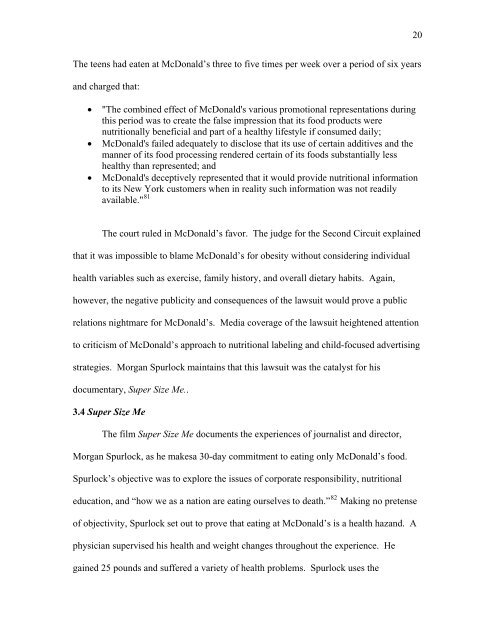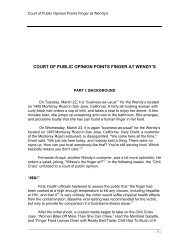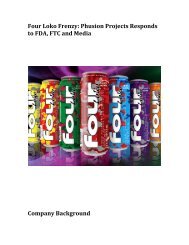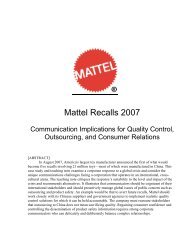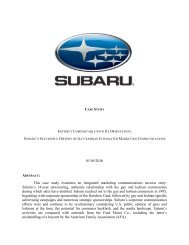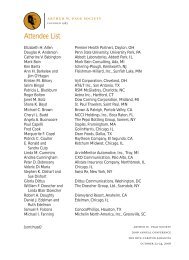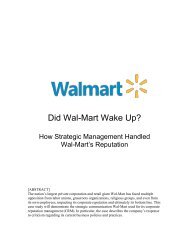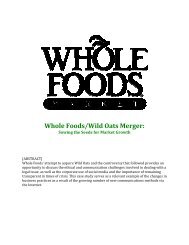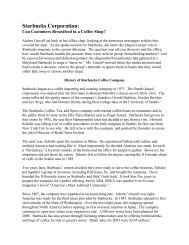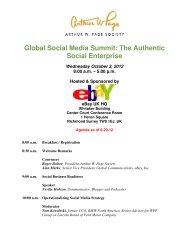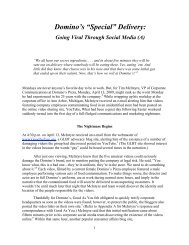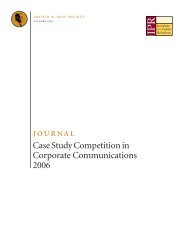McDonald - The Arthur Page Society
McDonald - The Arthur Page Society
McDonald - The Arthur Page Society
Create successful ePaper yourself
Turn your PDF publications into a flip-book with our unique Google optimized e-Paper software.
<strong>The</strong> teens had eaten at <strong>McDonald</strong>’s three to five times per week over a period of six years<br />
and charged that:<br />
• "<strong>The</strong> combined effect of <strong>McDonald</strong>'s various promotional representations during<br />
this period was to create the false impression that its food products were<br />
nutritionally beneficial and part of a healthy lifestyle if consumed daily;<br />
• <strong>McDonald</strong>'s failed adequately to disclose that its use of certain additives and the<br />
manner of its food processing rendered certain of its foods substantially less<br />
healthy than represented; and<br />
• <strong>McDonald</strong>'s deceptively represented that it would provide nutritional information<br />
to its New York customers when in reality such information was not readily<br />
available." 81<br />
<strong>The</strong> court ruled in <strong>McDonald</strong>’s favor. <strong>The</strong> judge for the Second Circuit explained<br />
that it was impossible to blame <strong>McDonald</strong>’s for obesity without considering individual<br />
health variables such as exercise, family history, and overall dietary habits. Again,<br />
however, the negative publicity and consequences of the lawsuit would prove a public<br />
relations nightmare for <strong>McDonald</strong>’s. Media coverage of the lawsuit heightened attention<br />
to criticism of <strong>McDonald</strong>’s approach to nutritional labeling and child-focused advertising<br />
strategies. Morgan Spurlock maintains that this lawsuit was the catalyst for his<br />
documentary, Super Size Me..<br />
3.4 Super Size Me<br />
<strong>The</strong> film Super Size Me documents the experiences of journalist and director,<br />
Morgan Spurlock, as he makesa 30-day commitment to eating only <strong>McDonald</strong>’s food.<br />
Spurlock’s objective was to explore the issues of corporate responsibility, nutritional<br />
education, and “how we as a nation are eating ourselves to death.” 82 Making no pretense<br />
of objectivity, Spurlock set out to prove that eating at <strong>McDonald</strong>’s is a health hazand. A<br />
physician supervised his health and weight changes throughout the experience. He<br />
gained 25 pounds and suffered a variety of health problems. Spurlock uses the<br />
20


